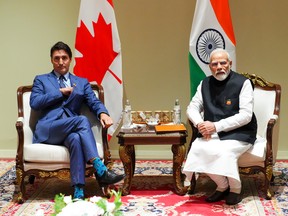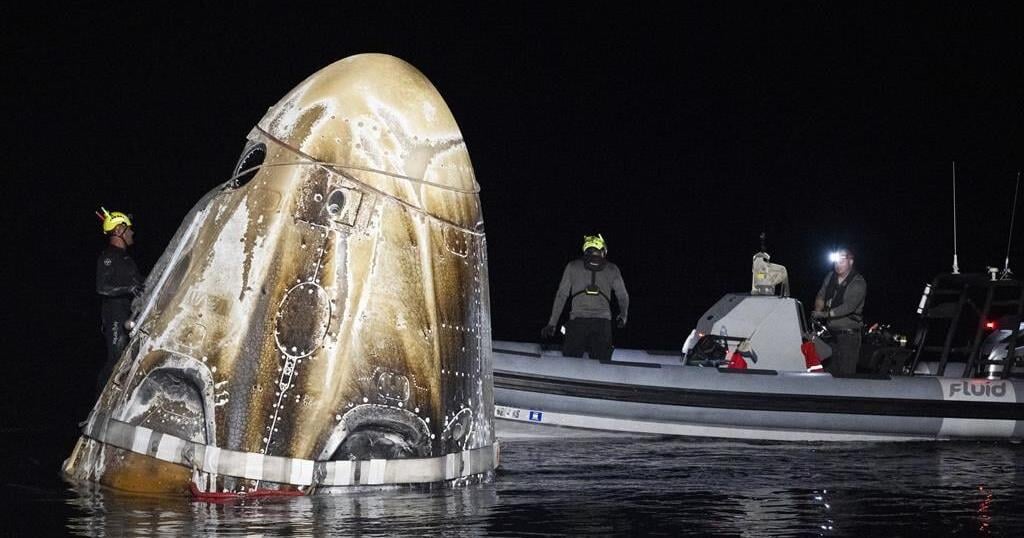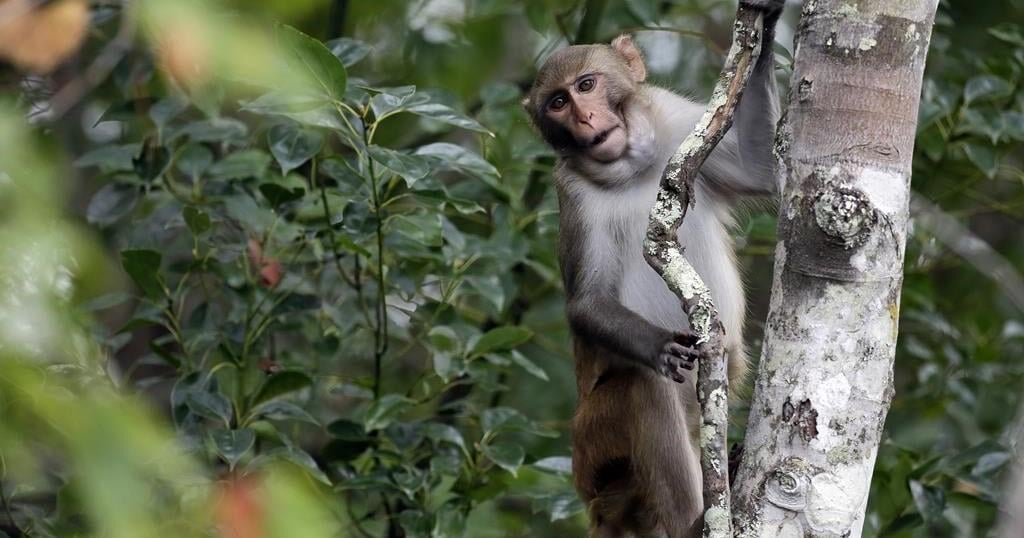It was only three months ago that Prime Minister Justin Trudeau delivered one of the most serious allegations a Canadian government has ever levelled against an ostensible ally – and then proceeded to not provide any evidence to this effect whatsoever.
News
U.S. provides what Canada never could — evidence against India
Canada loudly accused India of an assassination plot without evidence. The U.S. brought loads of evidence … and made the accusation quietly

On Sept. 18, Trudeau opened a sitting of the House of Commons by issuing a surprising announcement that the Indian government was responsible for the June shooting death of Hardeep Singh Nijjar, a Sikh separatist figure based in B.C.
As Indo-Canadian relations immediately descended into a swamp of mutual recrimination and tit-for-tat diplomat ejections, Trudeau didn’t back up his claims with video, phone transcripts, a description of the alleged plot or even an official confirmation from his own intelligence agencies.
All the public got was a line that investigators were “actively pursuing credible allegations of a potential link.” And when India balked at the charge, Trudeau could only respond that they should treat this issue “with the utmost seriousness.”
But just this week, the U.S. did what Canada couldn’t: It provided a detailed summary of an alleged conspiracy to assassinate Sikh extremists based in North America, as well as the evidence purporting to tie it to the Government of India.
Details of the U.S. case were revealed Wednesday in an unsealed indictment against 52-year-old Indian national Nikhil Gupta, whom prosecutors accuse of orchestrating a “murder for hire” plot for the Indian government.
“In or about May 2023, (an Indian government employee) recruited Gupta to orchestrate the assassination of the Victim in the United States,” reads a Wednesday statement from the U.S. Department of Justice.
The “Victim” is Gurpatwant Singh Pannun, an attorney based in New York State with a long history of calls for the creation of Khalistan, a Sikh nation that would be carved out of the Indian state of Punjab.
Pannun is considered a terrorist by the Indian government, and has occasionally made headlines in Canada for orchestrating non-official Khalistan referenda in B.C. In September, he was officially condemned by members of the federal cabinet after he released a video telling Hindus to “leave Canada.”
The indictment also contains key details about the killing of Nijjar.
Investigators purport to have emails and phone conversations sent between Gupta and his Indian government handler, who is identified in the documents as CC-1.
After Nijjar’s killing, the handler reportedly sent images of Nijjar’s corpse to Gupta, which he appears to have then forwarded to his fake hitman. According to documents, Gupta said in a clandestinely recorded call that Pannun was one just one target among many, and “we have so many targets.”
Gupta was arrested a mere 10 days later on an international warrant, shortly after he had arrived in the Czech Republic.
The charges have not been tried before a court, but the indictment is based on a ream of video, text, and audio intercepts.
During a discussion about the killing of Nijjar, Gupta reportedly said “we didn’t give (the U.S. hitman) this job, so some other guy did this job.”
What the indictment doesn’t contain is anything linking the alleged plot to the top levels of the Indian government. The only Indian official involved is CC-1, who is identified only as a “Senior Field Officer” who once mentioned being a member of India’s Central Reserve Police Force.
This distinction – and the sheer volume of evidence in the indictment – might be why India has been much friendlier with the U.S. allegation than it was with Canada’s.
Trudeau’s accusation of an Indian murder plot prompted outright denials from New Delhi, counter-accusations that Canada was a hotbed for Sikh terrorism, a significant fraying of Canada’s diplomatic relationship with India – as well as a wave of anti-Trudeau coverage on Indian media.
But against the U.S. allegation, India’s foreign ministry said it had set up a committee to probe the matter directly, calling it “a matter of concern” and “against government policy.”
Two of the Trudeau government’s favourite issues – reconciliation and carbon pricing – will soon be facing off in court. The Chiefs of Ontario and the Attawapiskat First Nation are suing the federal government over allegations that their carbon pricing scheme is “discriminatory and anti-reconciliatory.” The federal carbon tax functions by dinging you at the gas pump, and then refunding most of that money via regular CRA rebates. But the Chiefs of Ontario note that on-reserve First Nations don’t pay income taxes for any income earned on reserve – thus, they’re paying the carbon tax but not getting the rebates. This would be easy to fix with a carbon tax carve-out for anyone flashing a status card at the gas station – but the Liberals are somewhat constrained by their promise to never, ever approve any additional carbon tax carveouts following that one they just greenlit for Atlantic Canada.

It was over the summer that Google first announced the seismic news that it planned to bar all Canadian news content from its search engine as a direct response to the Trudeau government’s Online News Act. The act barred internet giants such as Google from circulating Canadian news links on their platforms unless they figured out a way to compensate the creators of said links (such as yours truly). To this came the somewhat predictable reaction that Google and Facebook would simply stop dealing in Canadian news links. But a compromise position was reached this week; Google won’t shut off the news taps, and in exchange they’ll only have to hand over about $100 million a year instead of the $175 million that was expected under the Online News Act’s original formula.
If you’re reading this near Oshawa, Ont. and you see a kangaroo out the window, it’s not your imagination. One of the marsupials escaped from Oshawa Zoo handlers on Friday morning and remains at large as of press time.

News
NASA astronauts won’t say which one of them got sick after almost eight months in space

CAPE CANAVERAL, Fla. (AP) — Three NASA astronauts whose prolonged space station mission ended with a trip to the hospital last month declined to say Friday which one of them was sick.
Astronauts Matthew Dominick, Michael Barratt and Jeanette Epps publicly discussed their spaceflight for the first time since returning from the International Space Station on Oct. 25. They spent nearly eight months in orbit, longer than expected because of all the trouble with Boeing’s Starliner crew capsule and rough weather, including Hurricane Milton.
Soon after their SpaceX capsule splashed down in the Gulf of Mexico off the Florida coast, the three were taken to a hospital in nearby Pensacola along with Russian cosmonaut Alexander Grebenkin, who launched with them back in March.
One of the Americans ended up spending the night there for an undisclosed “medical issue.” NASA declined to say who was hospitalized or why, citing medical privacy.
When asked at Friday’s news conference which one had been sick, the astronauts refused to comment. Barratt, a doctor who specializes in space medicine, declined to even describe the symptoms that the unidentified astronaut had.
“Spaceflight is still something we don’t fully understand. We’re finding things that we don’t expect sometimes. This was one of those times and we’re still piecing things together on this,” said Barratt, the only member of the crew who had flown in space before.
Epps said everyone is different in how they respond to space — and gravity.
“That’s the part that you can’t predict,” she said, adding, “Every day is better than the day before.”
Dominick said little things like sitting comfortably in a hard chair took several days to get used to once he returned. He said he didn’t use the treadmill at all during his time in space, as part of an experiment to see what equipment might be pared on a long trip to Mars. The first time he walked was when he got out of the capsule.
The two astronauts who served as test pilots for Boeing’s Starliner — Butch Wilmore and Suni Williams — will remain at the space station until February, flying back with SpaceX. Starliner returned empty in September.
___
The Associated Press Health and Science Department receives support from the Howard Hughes Medical Institute’s Science and Educational Media Group. The AP is solely responsible for all content.
The Canadian Press. All rights reserved.
News
43 monkeys remain on the run from South Carolina lab. CEO thinks they’re having an adventure

COLUMBIA, S.C. (AP) — Forty-three monkeys bred for medical research that escaped a compound in South Carolina have been spotted in the woods near the site and workers are using food to try to recapture them, authorities said Friday.
The Rhesus macaques made a break for it Wednesday after an employee at the Alpha Genesis facility in Yemassee didn’t fully lock a door as she fed and checked on them, officials said.
“They are very social monkeys and they travel in groups, so when the first couple go out the door the others tend to just follow right along,” Alpha Genesis CEO Greg Westergaard told CBS News.
Westergaard said his main goal is to have the monkeys returned safely with no other problems. “I think they are having an adventure,” he said.
The monkeys on Friday were exploring the outer fence of the Alpha Genesis compound and are cooing at the monkeys inside, police said in a statement.
“The primates are exhibiting calm and playful behavior, which is a positive indication,” the police statement said, adding company workers are closely watching the monkeys while keeping their distance as they work to safely recapture them.
The monkeys are about the size of a cat. They are all females weighing about 7 pounds (3 kilograms).
Alpha Genesis, federal health officials and police all said the monkeys pose no risk to public health. The facility breeds the monkeys to sell to medical and other researchers.
“They are not infected with any disease whatsoever. They are harmless and a little skittish,” Yemassee Police Chief Gregory Alexander said Thursday.
Authorities still recommend that people who live near the compound about 1 mile (1.6 kilometers) from downtown Yemassee shut their windows and doors and call 911 if they see the monkeys. Approaching them could make them more skittish and harder to capture, officials said.
Eve Cooper, a biology professor at the University of Colorado Boulder who has studied rhesus macaques, said the animals have the potential to be dangerous and urged people to keep their distance.
Rhesus macaques monkeys can be aggressive. And some carry the herpes B virus, which can be fatal to humans, Cooper said.
However, Alpha Genesis states on its website that it specializes in pathogen-free primates. Cooper noted that there are pathogen-free populations of rhesus macaques that have been quarantined and tested.
“I would give them a wide berth,” Cooper said. “They’re unpredictable animals. And they can behave quite aggressively when they’re afraid.”
Alpha Genesis provides primates for research worldwide at its compound about 50 miles (80 kilometers) northeast of Savannah, Georgia, according to its website.
Locally, it is known as “the monkey farm.” And there is more amusement than panic around Yemassee and its population of about 1,100 just off Interstate 95 about 2 miles from Auldbrass Plantation, a Frank Lloyd Wright house designed in the 1930s.
There have been escapes before, but the monkeys haven’t caused problems, said William McCoy, who owns Lowcountry Horology, a clock and watch repair shop.
“They normally come home because that’s where the food is,” he said.
McCoy has lived in Yemassee for about two years and while he plans to stay away from the monkeys, he has his own light-hearted plan to get them back.
“I’m stocking up bananas, maybe they’ll show up,” McCoy said.
The Alpha Genesis compound is regularly inspected by federal officials.
In 2018, the U.S. Department of Agriculture fined Alpha Genesis $12,600 in part after officials said 26 primates escaped from the Yemassee facility in 2014 and an additional 19 got out in 2016.
The company’s fine was also issued because of individual monkey escapes as well as the killing of one monkey by others when it was placed in the wrong social group, according to a report from the USDA.
The group Stop Animal Exploitation Now sent a letter Thursday to the USDA asking the agency to immediately send an inspector to the Alpha Genesis facility, conduct a thorough investigation and treat them as a repeated violator. The group was involved in the 2018 fine against the company.
“The clear carelessness which allowed these 40 monkeys to escape endangered not only the safety of the animals, but also put the residents of South Carolina at risk,” wrote Michael Budkie, executive director of the group.
The USDA, which has inspected the compound 10 times since 2020, didn’t immediately respond to the letter.
The facility’s most recent federal inspection in May showed there were about 6,700 primates on site and no issues.
In a 2022 review, federal veterinarians reported two animals died when their fingers were trapped in structures and they were exposed to harsh weather. They also found cages weren’t adequately secure. Inspectors said criminal charges, civil penalties or other sanctions could follow if the problems weren’t fixed.
Since then, Alpha Genesis has undergone six inspections with minor problems reported only once.
In January 2023, the USDA said temperatures were out of the 45 to 85 degree Fahrenheit (7.2 to 29.5 degree Celsius) required range at some of the compound’s monkey cages. The inspection found moldy food in one bin, sharp edges on a gate that could cut an animal and sludge, food waste, used medical supplies, mechanical equipment, and general construction debris on the grounds.
Supporters of medical research involving nonhuman primates said they are critical to lifesaving medical advances like creating vaccines against COVID-19 because of their similarities to people. Keeping a domestic supply of the animals is critical to prevent shortages for U.S. researchers.
Humans have been using the rhesus macaque for scientific research since the late 1800s. Scientists believe that rhesus macaques and humans split from a common ancestor about 25 million years ago and share about 93% of the same DNA.
These monkeys have been launched into space on V2 rockets, used for AIDS research, had their genome mapped and made stars of their own reality television show. They were in such high demand in the early 2000s that a shortage led to scientists paying up to $10,000 per animal.
Outside of rats and mice, rhesus macaques are one of the most studied animals on the planet, said Dario Maestripieri, a behavioral scientist at the University of Chicago who wrote the 2007 book “Macachiavellian Intelligence: How Rhesus Macaques and Humans Have Conquered the World.”
The animals are very family oriented, siding with relatives when fights break out. And they’re adept at building political alliances in the face of threats from other monkeys. But they can be painful to watch. Monkeys with lower status in the hierarchy live in a constant state of fear and intimidation, Maestripieri said.
“In some ways, they kind of represent some of the worst aspects of human nature,” Maestripieri said.
___
Lovan reported from Louisville, Kentucky, and Finley reported from Norfolk, Virginia.
News
Freeland says she’s ready to deal with Trump |

Finance Minister Chrystia Freeland speaks with reporters after chairing a special cabinet committee working on Canada’s plan to deal with the incoming Donald Trump administration. Freeland says she’s stood up for Canadian interests in the past and is ready to go another round. (Nov. 8, 2024)
-

 Business12 hours ago
Business12 hours agoTelus prioritizing ‘most important customers,’ avoiding ‘unprofitable’ offers: CFO
-

 News1 hour ago
News1 hour agoFreeland says she’s ready to deal with Trump |
-

 News15 hours ago
News15 hours agoTime limits were meant to speed up justice. They also halt hundreds of criminal cases
-

 News1 hour ago
News1 hour agoNASA astronauts won’t say which one of them got sick after almost eight months in space
-

 News13 hours ago
News13 hours agoWho will buy Infowars? Both supporters and opponents of Alex Jones interested in bankruptcy auction
-

 News1 hour ago
News1 hour ago43 monkeys remain on the run from South Carolina lab. CEO thinks they’re having an adventure
-

 News13 hours ago
News13 hours ago‘Big frustration’: How a limited MAID window affects Alzheimer’s patients
-

 Politics10 hours ago
Politics10 hours ago‘Disgraceful:’ N.S. Tory leader slams school’s request that military remove uniform


















